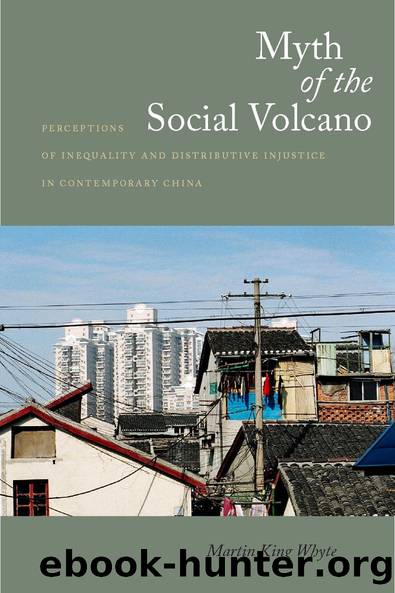Myth of the Social Volcano by Martin Whyte

Author:Martin Whyte [Whyte, Martin]
Language: eng
Format: epub
ISBN: 9780804769426
Barnesnoble:
Publisher: Stanford University Press
Published: 2010-02-24T00:00:00+00:00
TABLE 7.3
Correlations and regressions of attitudes favoring inequality
Turning to the final scale in Table 7.3, market competition, the associations are similar to those observed with the government leveling scale in Table 7.2. Because we discovered in Table 7.1 that these two attitude scales are positively rather than negatively correlated, this similarity is not all that surprising. Nonetheless, this finding does contradict our initial expectation that respondents who favored government leveling would disagree with statements about the virtues of market competition and that champions of market competition would oppose government efforts to promote equality.
In terms of specifics, the first column under market competition shows a pattern similar to that reported in Table 7.2 for government leveling, with rural occupational groups generally opposing market competition and urban occupational groups expressing agreement. The one difference is that migrants join other urban groups in advocating market competition, while they neither favor nor oppose government leveling. Once we control for other background traits in the two regression models, however, the other three groups with rural registration do not differ significantly from the comparison group of urban unskilled and semiskilled workers. However, migrants, the urban unemployed, and routine nonmanual workers are all significantly more likely than the comparison group to favor market competition. This is a curious finding, given that these groups are somewhat marginal within the status hierarchy of cities and might be expected to feel that they have not derived fair benefit from new opportunities. Nonetheless, these are the groups that speak most approvingly of market competition.24 Perhaps these groups share a conviction that they would be able to do even better than at present if current institutionalized preferences enjoyed by other groups were weakened via more fully developed market competition.
In terms of demographic and socioeconomic characteristics , before we control for other traits there is a tendency for the advantaged (those with more education, higher incomes, party membership, and so on) to voice approval of market competition, while women tend to disapprove. Once we control for other background factors, the disapproving view of women is still visible, as is the net approving effect of being highly educated and belonging to the Han ethnic group. However, the other coefficients are no longer statistically significant. Curiously, those with more sources of information beyond the official media, a trait we thought might foster independent and relatively critical attitudes, is actually associated with a net approving attitude toward market competition.
The pattern of associations between the geographic location measures and market competition once again defies easy interpretation. Looking only at the correlation coefficients, it appears that residents of central provinces favor market competition, while residents in western provinces and respondents far from any city are opposed. However, once we control for other background predictors and correct for the clustering problem in our geographic variables (as discussed in Chapters 5 and 6), the effect of region becomes insignificant, while the effect of distance to the city is reversed. All else being equal, the net impact of living far away from any city is to favor market competition.
Download
This site does not store any files on its server. We only index and link to content provided by other sites. Please contact the content providers to delete copyright contents if any and email us, we'll remove relevant links or contents immediately.
Cecilia; Or, Memoirs of an Heiress — Volume 1 by Fanny Burney(32558)
The Great Music City by Andrea Baker(32019)
Cecilia; Or, Memoirs of an Heiress — Volume 2 by Fanny Burney(31956)
Cecilia; Or, Memoirs of an Heiress — Volume 3 by Fanny Burney(31942)
We're Going to Need More Wine by Gabrielle Union(19046)
All the Missing Girls by Megan Miranda(16029)
Pimp by Iceberg Slim(14508)
For the Love of Europe by Rick Steves(14121)
Bombshells: Glamour Girls of a Lifetime by Sullivan Steve(14076)
Talking to Strangers by Malcolm Gladwell(13370)
Norse Mythology by Gaiman Neil(13365)
Fifty Shades Freed by E L James(13241)
Mindhunter: Inside the FBI's Elite Serial Crime Unit by John E. Douglas & Mark Olshaker(9343)
Crazy Rich Asians by Kevin Kwan(9292)
The Lost Art of Listening by Michael P. Nichols(7506)
Enlightenment Now: The Case for Reason, Science, Humanism, and Progress by Steven Pinker(7313)
The Four Agreements by Don Miguel Ruiz(6765)
Bad Blood by John Carreyrou(6621)
Weapons of Math Destruction by Cathy O'Neil(6281)
